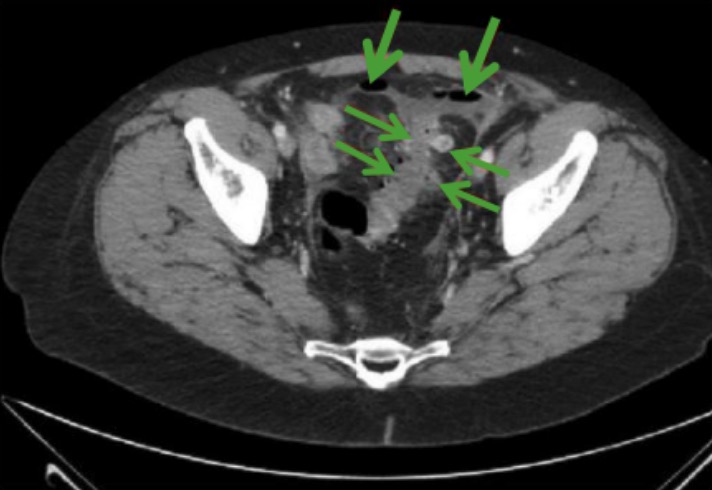Playlist
Show Playlist
Hide Playlist
Diverticular Disease
-
Slides Small and large bowel.pdf
-
Download Lecture Overview
00:01 If that was angiodysplasia, and an extremely common cause of painless rectal bleeding, now we're going through the spectrum of diverticular disease. 00:11 And you will know it and you should understand it exactly as to how I am telling you with diverticular disease. Let us begin. 00:19 Diverticulum. Generically speaking means an outpouching. 00:24 Whenever there is a weakness in the mucosa of that particular lumen, then with increase intraluminal pressure of that particular structure, you are then going to bring about or induce outpouching. 00:37 Here, with diverticular disease, our focus will be in the colon. 00:41 It is an acquired herniation of the mucosa and submucosa through the muscularis of the colon, which are the points of weakness. 00:51 Almost all diverticula of the large bowel are pseudodiverticula. 00:55 They involve only the mucosa and submucosa layers of the bowel wall, not the entire thickness. 01:02 When inflamed, the diverticulum, which at first will be diverticulosis, and this diverticulum by the way is a false diverticulum because you are not moving through all layers of the mucosa and at some point, we will talk about how feces gets trapped in your diverticulum. 01:23 Fecalith and the diverticulosis, when there's enough of these fecalith accumulating, imagine, feces, you have a river of feces passing through your colon. 01:33 Do you see that? River feces. And then you have a diverticulum, why? Because you look like this, [Straining] Right? What happened? Low fiber high fat diet. Years and years, and years of the 'western diet'. 01:46 Low fiber, high fat diet. 01:49 When you are sitting there on the toilet constipated as such that I just dramatically demonstrated, then you have outpouching. 01:57 So that was my interpretation or impression of constipation and that outpouching then accumulates your feces and fecalith. 02:06 Now these may then become infected. When it does so, you have now transitioned into diverticulitis. Your focus should be in itis, which is inflammation and the patient is going to present with fever. 02:18 Most comma cause? It is a common cause of lower GI bleeding. 02:22 Along with this do not forget about angiodysplasia. 02:25 In this case, with acute inflammation, when you know that there is diverticulum, an outpouching and perhaps there is diverticulitis, there is already a possibility of rupture and if that rupture does takes place, then your patient is in a state of guarding peritonitis. Do not touch me. 02:46 Do not touch me, I will knock you, abdominal pain is guarding, right? Peritonitis. 02:51 So when there is acute inflammation you probably would not want to do a colonoscopy which would then exacerbate or facilitate the rapture of that diverticulum. 03:03 Avoid colonoscopy during acute inflammation. 03:07 With diverticular disease, what you're worried about especially when diverticulitis has set in, complications, perforation, abscesses, fistula formation and bleeding, bleeding, bleeding. 03:19 But the bleeding all ready had taken place even during the stage of diverticulosis. 03:23 So just to make sure we're clear, we have diverticular disease. 03:28 We talked about reasons: low fiber, high fat diet. 03:31 There is an acquired outpouching that is a false diverticulum. 03:36 When there is outpouching as such, understand the blood vessels are being stretched it may then rapture and may result in painless rectal bleeding that is your diverticulosis. 03:46 At some point in time, the feces may then accumulate within the diverticulum. 03:50 You will have infection setting in this now result in diverticulitis. 03:55 With the diverticulitis taking place with infection there is every possibility that you are increase in the risk of perforation and peritonitis. 04:03 With infection setting in obviously abscess is always going to be an issue. 04:07 Fistula formation and bleeding taking place already. 04:12 Management: bowel rest and antibiotics. 04:16 Lower colonoscopy. And what you are seeing here are holes, or really caves of outpouching. Weakness of the mucosa, submucosa through the muscularis layer, and accumulation of feces at some point, and they cannot see that here, but you can imagine feces in going in there, we call that fecalith, and then if you're going to take a look at your barium enema, for the most part you would see as well hiding of the barium in the outpouchings.
About the Lecture
The lecture Diverticular Disease by Carlo Raj, MD is from the course Small and Large Intestine Diseases: Basic Principles with Carlo Raj.
Included Quiz Questions
Which investigation is BEST avoided when the diverticular disease is acutely inflamed?
- Colonoscopy
- Double-contrast barium enema
- Abdominal ultrasound scan
- Abdominal plain X-ray
- Proctoscopic examination
What is the MOST common cause of lower gastrointestinal bleeding?
- Diverticular disease
- Inflammatory bowel disease
- Ischemic bowel disease
- Colon cancer
- Irritable bowel syndrome
Which of the following is NOT a complication of diverticular disease?
- Colon cancer
- Bleeding
- Fistula
- Abscess formation
- Perforation
Which of the following is a risk factor for the formation of diverticular disease?
- Low-fiber and high-fat diet
- Smoked fish
- Lack of vitamin C in the diet
- Chronic alcoholism
- Use of artificial sweeteners in the diet
Customer reviews
5,0 of 5 stars
| 5 Stars |
|
1 |
| 4 Stars |
|
0 |
| 3 Stars |
|
0 |
| 2 Stars |
|
0 |
| 1 Star |
|
0 |
Excellent lecture by Dr.Raj , i like it very much. i love his sense of humor




